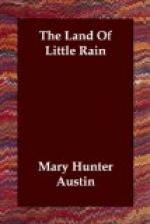Of what account is it to lack meal or meat when you may have it of any neighbor?
Besides, there is sometimes a point of honor in these things. Jesus Romero, father of ten, had a job sacking ore in the Marionette which he gave up of his own accord. “Eh, why?” said Jesus, “for my fam’ly.”
“It is so, senora,” he said solemnly, “I go to the Marionette, I work, I eat meat—pie—frijoles—good, ver’ good. I come home sad’day nigh’ I see my fam’ly. I play lil’ game poker with the boys, have lil’ drink wine, my money all gone. My family have no money, nothing eat. All time I work at mine I eat, good, ver’ good grub. I think sorry for my fam’ly. No, no, senora, I no work no more that Marionette, I stay with my fam’ly.” The wonder of it is, I think, that the family had the same point of view.
Every house in the town of the vines has its garden plot, corn and brown beans and a row of peppers reddening in the sun; and in damp borders of the irrigating ditches clumps of yerba santa, horehound, catnip, and spikenard, wholesome herbs and curative, but if no peppers then nothing at all. You will have for a holiday dinner, in Las Uvas, soup with meat balls and chile in it, chicken with chile, rice with chile, fried beans with more chile, enchilada, which is corn cake with a sauce of chile and tomatoes, onion, grated cheese, and olives, and for a relish chile tepines passed about in a dish, all of which is comfortable and corrective to the stomach. You will have wine which every man makes for himself, of good body and inimitable bouquet, and sweets that are not nearly so nice as they look.
There are two occasions when you may count on that kind of a meal; always on the Sixteenth of September, and on the two-yearly visits of Father Shannon. It is absurd, of course, that El Pueblo de Las Uvas should have an Irish priest, but Black Rock, Minton, Jimville, and all that country round do not find it so. Father Shannon visits them all, waits by the Red Butte to confess the shepherds who go through with their flocks, carries blessing to small and isolated mines, and so in the course of a year or so works around to Las Uvas to bury and marry and christen. Then all the little graves in the Campo Santo are brave with tapers, the brown pine headboards blossom like Aaron’s rod with paper roses and bright cheap prints of Our Lady of Sorrows. Then the Senora Sevadra, who thinks herself elect of heaven for that office, gathers up the original sinners, the little Elijias, Lolas, Manuelitas, Jose, and Felipes, by dint of adjurations and sweets smuggled into small perspiring palms, to fit them for the Sacrament.




